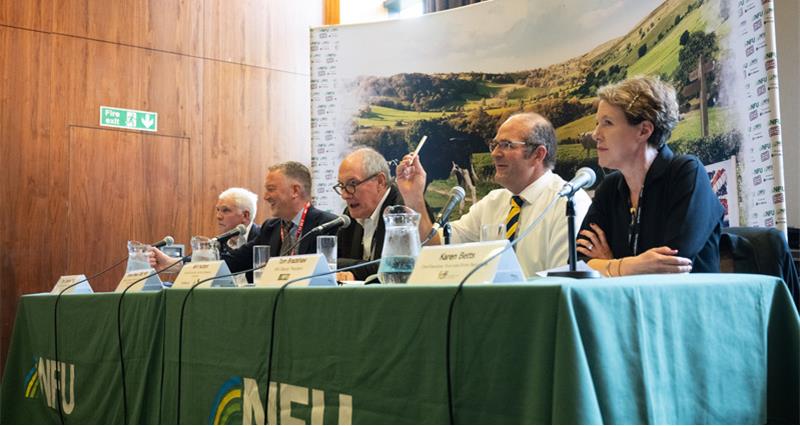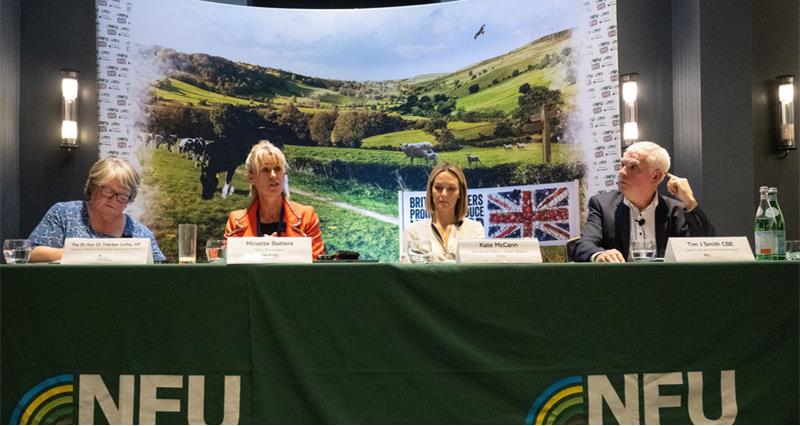Our run of successful fringe events continued with Deputy President Tom Bradshaw leading the charge in front of another packed-out room, urging the Labour Party to have a clear policy for food security.
The event brought together Shadow Secretary of State for Defra Steve Reed MP OBE, Chair of the FDSC (Food and Drink Sector Council) Tim Smith CBE, and Chief Executive of the FDF (Food and Drink Federation) Karen Betts OBE alongside Deputy President Tom Bradshaw to discuss "Food cannot fail: What's the Labour Party's long-term plan for British agriculture?".
The event was robustly chaired by Will Hutton, political economist, author and columnist for the Observer. Will kicked off the evening noting that the attendance in the room was a tribute to the salience of the issues being discussed. He highlighted what he saw as the four cornerstones of the debate: security of supply chains, health and nutrition, environmental protection intersecting with food production and trade.
No room for complacency
Diving straight in, Tom Bradshaw said that the idea that food could fail in the UK was “terrifying”. He noted there has been a lack of commitment from the current government in putting their words into action, especially in relation to having a strategy for growth for the horticulture industry. Tom was adamant that although we produce 60% of our food in the UK it could and should be 75%. He said it is vital that food production targets are legislated for in the same way environmental targets have been. He said the budget for food production needs to match our ambition in the industry.
Chief Executive of the FDF Karen Betts said it was a privilege to be a nation with a secure food production system but stressed that there is no room for complacency. She called for any future government to deliver a cross-departmental clear strategy for sustainable food production.
Chair of the FDSC Tim Smith echoed these calls and said we need to sort out issues such as patchwork quilt of regulation, labour shortages and market inaccess and instead create a target for UK-sourced food. He went further, suggesting the creation of Cabinet sub-committee on food security. He also asked that any future government recognise the impact that Brexit has had on our food systems.
Shadow Defra Secretary Steve Reed MP was clear in his message to the audience from the beginning, that food security is national security. He said Labour would look at how Brexit can work better for food producers, saying Labour would ensure that there is not a mountain of red tape for farmers to climb over. He also insisted that a Labour government would guarantee a level playing field for farmers in any future trade deals.
Steve Reed pointed to the struggles of smaller farms and tenant farmers and said as the ELMS scheme stands today, it does not work for them. In the last words of his opening, Steve Reed committed that a Labour government would source 50% of government-procured food from British producers.
Questions from the audience
There was no shortage of questions for the panel. Audience members raised concerns about planning regulations, supporting skills in the sector and access to the countryside. On access, Steve Reed said that there is a conversation to be had about what responsible access to the countryside looks like. But reiterated that the Labour Party believe that everyone should be able to enjoy our shared heritage and landscape.
Tom Bradshaw made clear that the Labour Party needs to articulate what question they are trying to answer by wanting increased access to the countryside. Tom was forthright in pointing out that we already have some of the best access to the countryside in the world and the health and safety concerns of unfettered access.
There were also questions from young farmers in the audience including former Student & Young Farmer Ambassador member Joe Brammal who wanted to know what a Labour government would do to support young entrants into the industry.
Steve Reed pointed to the fact that a Labour government wants to invest in the industry by committing to sourcing at least 50% of government procured food from British producers. He said this would be worth at least ÂŁ1.2 billion and should indicate that the Party committed to making food production a financially viable industry.

Closing remarks
As the event came to an end, Tim Smith and Karen Betts were united in calling for a joined-up and coordinated approach from the government to help tackle the challenges the industry is facing while helping to enshrine a robust and resilient food production system in the UK.
Tom finished by saying the industry must have the support from the government and trust that they are genuinely committed to backing our world leading farmers. He said although a commitment on public procurement is great, it is vital that it is affordable to buy those ingredients in the first place. Finally, he said, there must be the option to export the first-class food that is produced in the UK.
In Steve Reed’s closing remarks, he noted that Keir Starmer’s approach to mission-led government is how the Labour Party will move away from siloed thinking and this will help deliver outcomes for the British people. He ended by saying in 1997 there were more Labour MPs in rural areas than Conservatives and to get back to that point the Labour Party are committed to engaging with rural communities with humility and respect.
Will Hutton
Political economist, author and columnist
Will is currently President of the Academy of Social Sciences, remains a regular columnist for the Observer and co-chairs the Purposeful Company – a think tank that argues that companies’ intrinsic purpose should drive their strategy, values and ultimately profit.
Will also chairs the advisory board of the Fairness Foundation, is governor of the National Institute for Economic and Social Research, a member of the Progressive Economic Forum and editorial advisory board of Prospect magazine.
Tom Bradshaw
NFU President
The home farm is based around arable production but has also diversified into equestrian and renewables.
Tom has represented the NFU from Local Branch Chairman through to Chair of the National Combinable Crops Board.
Tom was elected to the position of NFU President in February 2024.
Responsibilities
- Animal health and welfare incl. bTB
- Trade and standards
- Climate, energy and net zero
- Food supply chain (fair dealing, mergers and acquisitions, competition, regulation)
- Animal ID and movements
- Assurance review
- Taxation and fiscal policy
- Immigration
Tim J Smith CBE
Food and Drink Sector Council Chair
Tim leads the Council’s work to create change within the sector, build a more productive and sustainable food and drink system and look for new opportunities for co-operation within the wider government agenda. As part of his work with the Council, Tim will be delivering some of the measures outlined within the Government’s Food Strategy.
For over three decades Tim held leading roles at several manufacturers in the food sector including Northern Foods, Sara Lee, Express Dairies and latterly Arla Foods where he was CEO. Smith remains the Chairman of Cranswick plc. Between 2008 and 2012, Tim served as Chief Executive of the Food Standards Agency (FSA).
The Rt Hon Steve Reed MP OBE
Secretary of State for Environment, Food and Rural Affairs
He was elected as the MP for Streatham and Croydon North in July 2024.
The Secretary of State has overall responsibility for the Department for the Environment, Food and Rural Affairs. He has specific responsibilities for:
- budget, including Official Development Assistance (ODA)
- international relations
- senior appointments
- economic growth






